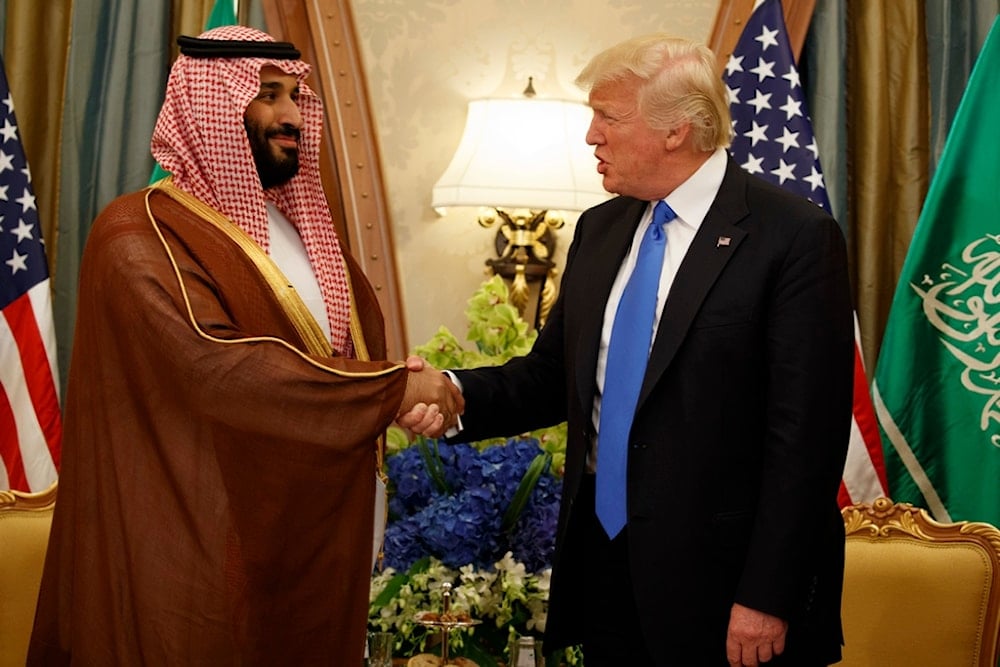Saudi seeks to mediate Iran-US nuclear talks
Saudi Arabia is once again positioning itself as the mediator in regional talks involving the United States as MBS wants to mediate Iran's talks with the US about the nuclear deal.
-

President Donald Trump shakes hands with Saudi Crown Prince Mohammed bin Salman during a bilateral meeting, in Riyadh, May 20, 2017. (AP)
Saudi Arabia is positioning itself as a potential mediator between the Trump administration and Iran in an effort to revive negotiations over Tehran’s nuclear program that President Trump had torpedoed during his first term, CNN has reported.
The kingdom hopes to leverage its close relationship with former US President Donald Trump to bridge the diplomatic gap with Iran, despite uncertainty over whether a formal offer had been extended. Riyadh's interest in mediation reflects its broader strategy of de-escalating tensions and securing a role in shaping a new nuclear agreement.
Though Saudi Arabia initially welcomed the 2015 nuclear deal, it later supported Trump’s 2018 withdrawal from the agreement. However, following the normalization of Saudi-Iran relations in a China-brokered agreement in March 2023, Riyadh proclaimed goals were to "prevent further regional instability."
Due to the recent wars Israeli wars on Gaza and Lebanon, Saudi officials view the current landscape as an opportunity to strengthen ties with Iran while avoiding entanglement in any US or Israeli confrontation. They are also concerned that further cornering Iran could push it towards nuclear armament, a scenario Riyadh believes should be prevented through diplomatic means.
Trump believes in diplomacy?
Since returning to the political spotlight, Trump has expressed a willingness to engage Iran in discussions for a new nuclear agreement. In a recent social media post, he reaffirmed his stance that Iran should not obtain nuclear weapons while also advocating for a "Verified Nuclear Peace Agreement."
"I would much prefer a Verified Nuclear Peace Agreement, which will let Iran peacefully grow and prosper. We should start working on it immediately, and have a big Middle East Celebration when it is signed and completed," Trump wrote on his social media platform, Truth Social.
Despite economic difficulties and domestic pressures, signals from Tehran regarding negotiations remain mixed. Iranian President Masoud Pezeshkian, elected on a platform of global reconciliation, has expressed openness to dialogue, while Leader Ayatollah Ali Khamenei has dismissed talks with Washington as unwise, though he has not explicitly forbidden engagement.
'Talks with US have no effect on resolving issues'
Iranian leader Sayyed Ali Khamenei has stated that experience has demonstrated that negotiations with the US do not contribute to resolving Iran's issues.
His comments came during a meeting with Air Force commanders in Tehran on Friday, just hours after the US implemented its first sanctions following President Donald Trump's order to reinstate his "maximum pressure" strategy on Iran.
"Negotiations with the US have no effect on solving the country's problems, we must get this right," Sayyed Khamenei said, adding, "They should not pretend to us that if we sit at the negotiating table with that government, the problems will be solved. No; negotiating with the US will not solve any problems. The reason? Experience!"
Sayyed Khamenei reflected on the 2015 nuclear deal, noting how Iran and six other countries, including the US, reached an agreement after two years of negotiations, only for Trump to later abandon it.
Saudi distances itself from 'maximum pressure'
According to Firas Maksad, a senior fellow at the Middle East Institute, Saudi Arabia’s interest in mediation aligns with its strategy of maintaining flexibility in foreign policy. By signaling a willingness to facilitate discussions, Riyadh distances itself from Trump’s previous "maximum pressure" campaign while enhancing its global diplomatic standing.
However, Riyadh’s relationship with Trump may be tested by his controversial proposal to displace Palestinians from Gaza, a plan Saudi Arabia has firmly rejected. This issue could derail US-brokered Saudi-Israeli normalization efforts, which Trump and Israeli Prime Minister Benjamin Netanyahu have aggressively pursued.
Saudi Arabia is particularly liked by Trump. He has even suggested that his first foreign visit as president could once again be to Saudi Arabia, where Crown Prince Mohammed bin Salman may find himself in the position of mediating not just between the US and Iran, but also between the US and Russia in efforts to end the war in Ukraine.

 4 Min Read
4 Min Read








